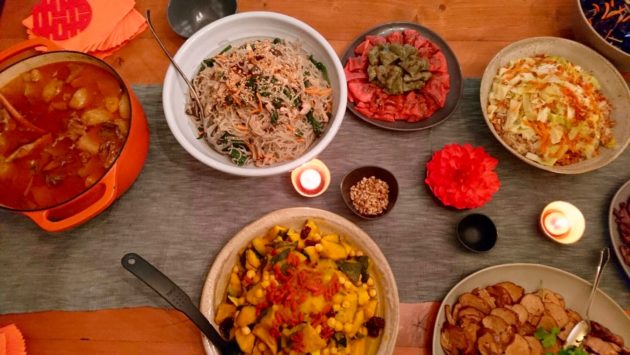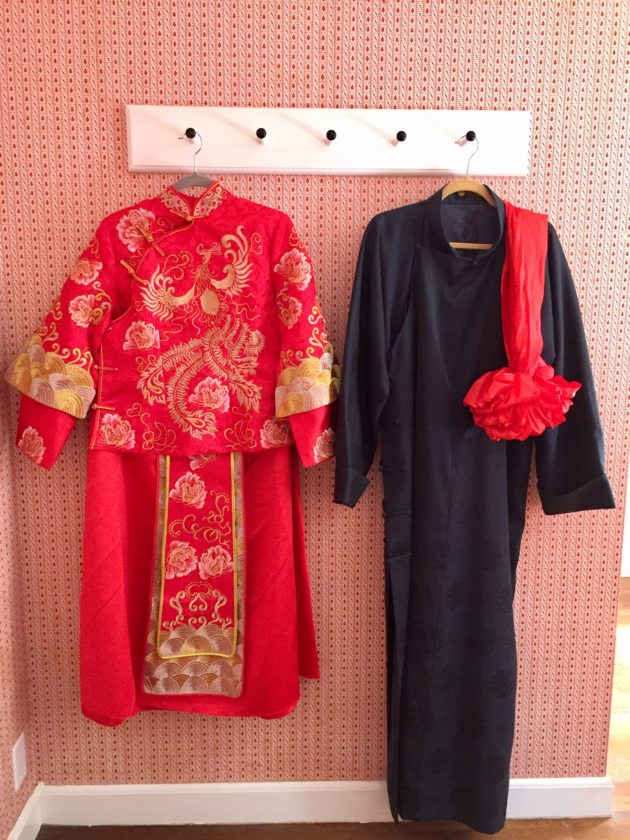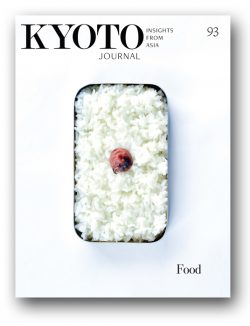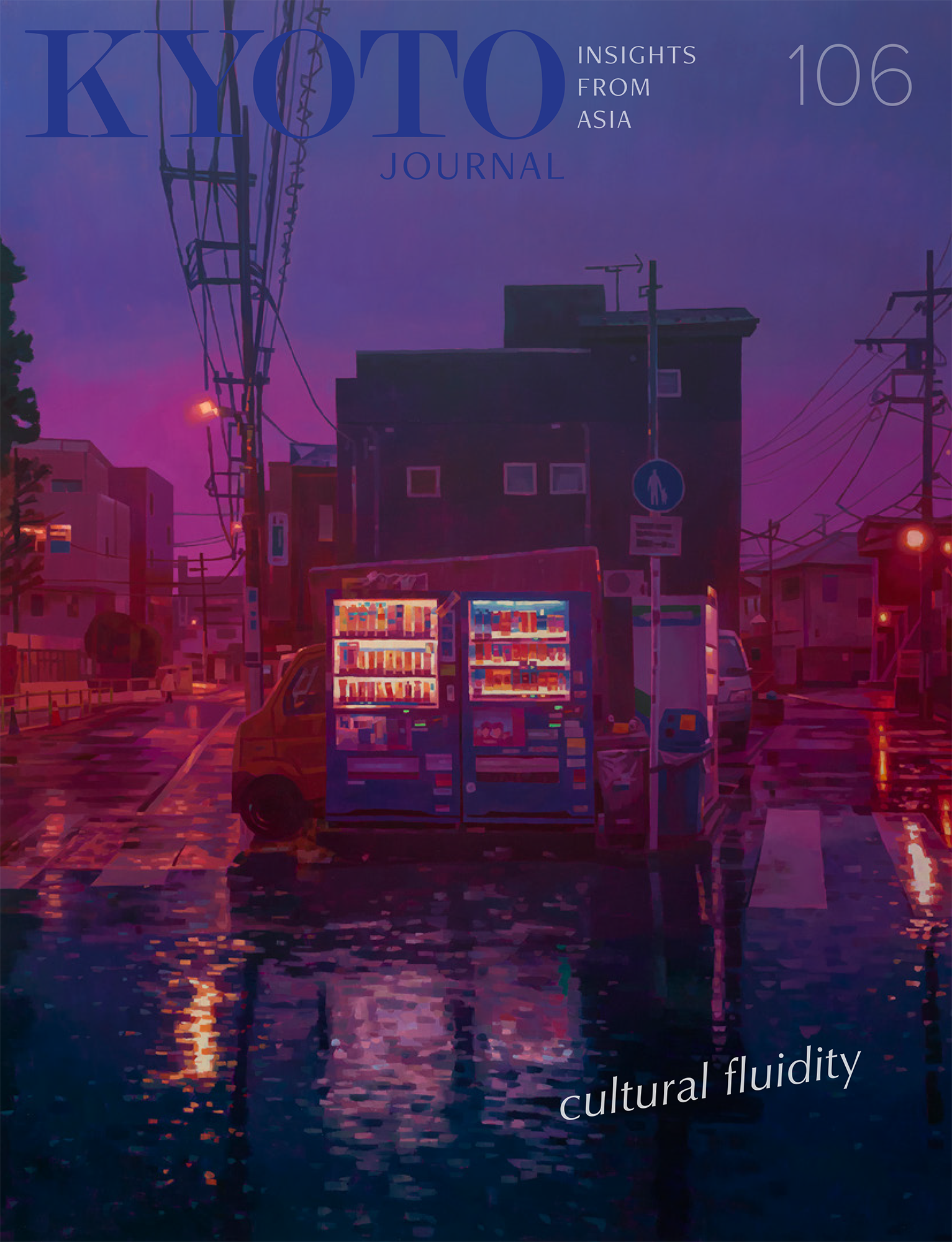Growing up in a traditional New England suburb, the only thing different about our family was that we ate rice every night and that our Taiwanese grandfather would practice tai chi on the lawn.
Though five years apart in age, my brother Chris and I attended the same small college where we met Megan and Amir. For many years now, despite moves to Vermont, Michigan, Japan and England, the four of us have reunited in our Concord home for holiday breaks. As we introduced our partners to our family’s habits, Chris and I became more aware of our own particular Asian-ness. We taught them terms like “lao yi lao,” referring to the act of fishing around a hot pot for your preferred morsel and “dok dok,” which means to mash a bunch of ingredients together for something like a wonton filling. Together we became regulars at Asian Gourmet, where we order fried turnip cakes, steamed buns and spicy beef tendon; and at least one morning, we’ll have rice porridge with a variety of pickles and fermented bits before going out into the woods for a brisk walk.
Returning to Concord as adults, it seemed my brother and I had recognized and expanded upon our Asian-ness in our own ways. But last October, when forty relatives from Taiwan, Singapore and Los Angeles moved in to our little town for a week-long celebration of Chris and Megan’s wedding, we wondered how our lives would hold a much higher concentration of Asian culture.
It began on Sunday with the arrival of my mom’s cousin Wei Ci who was tasked with cooking feast after feast for our entire extended family. Following common practice when relatives arrive from the motherland, we hastily cleared the dining room table to unpack bulging suitcases of Taiwanese specialties, though this time enough to feed a small army. Out came jars of homemade chili sauce and XO paste, vacuum-sealed packs of five-spice tofu, bags of dried noodles, packets of tea and freshly-ground white pepper, candied fruits, pineapple cakes and even a knife, hand towels, and a rice scooper.
Wei Ci was like a tornado. Jet-lagged, but fuelled with purpose, she whipped around the kitchen grabbing ingredients and any person walking by (my dad literally hid in his office to avoid being pulled in) and together we churned out dish after dish: wooden steamer baskets of glutinous rice studded with umami goodies, cauldrons of soul-warming soups, three dozen marbled tea eggs, and a variety of colourful stir-fries— each simple but nuanced with a splash of vinegar or cooking wine here, a hint of sesame oil or a roughly chopped pepper there.

It was surreal in a way— a gluttonous week-long holiday in the middle of October when everyone else was going about their normal lives. Our mornings were dedicated to overdue dentist appointments, haircuts and last-minute wedding preparations until the afternoon rolled around and it was time to prepare for another dinner. And even late into the evenings, when the festivities were in full swing, Wei Ci was cooking for the next one. On Wednesday night, as my dad’s family (all very large and loud) sat reminiscing around the kitchen table, Wei Ci began replacing the drinks and fruit with freshly-made dumpling skins and filling. The conversation didn’t skip a beat, hands just started reaching and scooping and folding and shaping. Within 15 minutes, they had wrapped over 200 dumplings.
On Friday morning, we were to host a Chinese tea ceremony, a wedding tradition in which the bride-to-be bows before each member of the family and serves them tea. Upon collecting their cup, she is presented with a red envelope and a blessing. Though still very common in Asian communities, the four of us had never even heard of such a ceremony; but the way my mom described it, and the fact that she got emotional every time, painted a scene in my head that it would be a beautifully somber experience of filial piety and reconnecting with our roots.
 We woke early to fill vases with twelve dozen orange roses and help Megan pin elaborate jewels into her hair. Her family sat politely, smiling at the new experience and marvelling at how beautiful she looked. They wished her luck and told her they loved her. Thankfully Megan and her family couldn’t understand Chinese because from start to finish, our entire side of the family was mumbling and arguing with one another about what she should be doing or saying. And when it came time for the blessings, they took Megan’s hands and told her to have as many children as she could, as soon as possible.
We woke early to fill vases with twelve dozen orange roses and help Megan pin elaborate jewels into her hair. Her family sat politely, smiling at the new experience and marvelling at how beautiful she looked. They wished her luck and told her they loved her. Thankfully Megan and her family couldn’t understand Chinese because from start to finish, our entire side of the family was mumbling and arguing with one another about what she should be doing or saying. And when it came time for the blessings, they took Megan’s hands and told her to have as many children as she could, as soon as possible.
Of the entire week, the actual wedding on Saturday at the Boston Museum of Science may be the thing that I remember the least. After a week of entertaining and orchestrating at home, it was a relief to put everything in the hands of the wedding planner, drink copious amounts of champagne and dance like maniacs to the ten-piece swing band. Looking back however, it felt as though it was the end of something. Now that Amir and I are based in England, and due to the extreme stress that plagued my mom for months before the occasion, it’s likely that our extended family will never gather in our Concord home like that again.
The morning after the wedding, Chris and Megan visited my grandfather’s grave, around the corner from Author’s Ridge where Henry David Thoreau, Louisa May Alcott, Ralph Waldo Emerson and other great literary figures are buried. It’s fitting in a way—our grandfather was a poet and spent his final decade in Concord writing about both the peace and isolation of the deep woods. Chris said to him in halting Chinese, “Grandfather, I want to update you. Megan and I are married now.”
This story was featured in: KJ93: Food.




